Guest post by Jeff Mosenkis of Innovations for Poverty Action.
- Three relatively recent additions to development Twitter worth noticing if you haven’t already, Tavneet Suri, Nava Ashraf, Seema Jayachandran. Here’s proof from just this week:
- There’s a new website devoted to making development research easily accessible, VoxDev.org. Editor Tavneet Suri says:
Here is our vision: We want to bring cutting-edge research to the forefront of decision making – for policymakers, the private sector, NGOs, the civil society, and everyone in between. We believe that the role of research should be elevated to inform economic decisions at every level. VoxDev will be the place where rigorous research on international development moves into practice; we will translate the state-of-the-art into pragmatic policy advice.
- From Nava Ashraf, video of Al Roth talking market design (version with slides here)
- From Seema Jayachandran – parents’ preference for having boys over girls in surveys is tricky to measure because of a literally “odd” phenomenon. Most parents, even in places like India, want the same number of boys and girls. The preference appears when they’re considering odd numbers of children and have to make a choice. This makes standard questions about wanting boys vs. girls a bit misleading.
- Outgoing WHO director Margaret Chan looks back on her tenure. She says the dirtiest fights in global health were with tobacco companies. She also worries about moves to make poor countries more self-sufficient in health because of risks beyond policymakers’ control:
In large parts of the developing world, especially in Africa, small-holder farmers in the informal sector remain the backbone of the economy, severely limiting domestic resources derived from taxes. Much of this agriculture depends on rain and is highly vulnerable to extreme weather events, which are becoming more common as the climate changes.
- David Evans has a roundup of 2 days of great education papers at the RISE conference on improving education systems, including links to individual videos.
- Speaking of education, my colleagues in Kenya are holding a conference and looking for presentations on research directly applicable to curriculum reform for Kenya (deadline July 7). The research doesn’t have to be from Kenya, but should be from somewhere similar enough in education to be applicable.
And incentives in everything – killer whales have started shaking down fishermen for their fish (via Chris). But there was an example in 1920’s Austrailia where orcas and humans cooperated in hunting for whales. For decades “The Law of the Tongue” meant that the orcas would help herd the whales for the humans, who would then harpoon the whales and share the carcass with the orcas (the orcas took the tongue). But like every good multiple round econ game, it worked great for both sides till one side got greedy (h/t my dad).



One Response
golu dolls